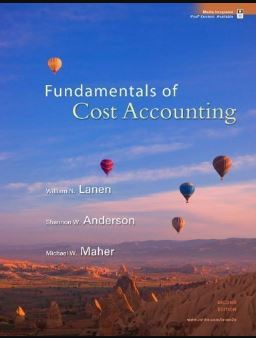
Fundamentals of Cost Accounting 2nd Edition by William Lanen, Carolyn Wells, Michael Maher
Edition 2ISBN: 978-0077274993
Fundamentals of Cost Accounting 2nd Edition by William Lanen, Carolyn Wells, Michael Maher
Edition 2ISBN: 978-0077274993 Exercise 35
Impact of Decisions to Capitalize or Expense on Performance Measurement: Ethical Issues
Pharmaceutical firms, oil and gas companies, and other ventures inevitably incur costs on unsuccessful investments in new projects (e.g., new drugs or new wells). For oil and gas firms, a debate continues over whether those costs should be written off as period expense or capitalized as part of the full cost of finding profitable oil and gas ventures. For pharmaceutical firms, GAAP in the United States is clear that R D costs are to be expensed when incurred.
Pharm-It has been writing R D costs off to expense as incurred for both financial reporting and internal performance measurement. However, this year a new management team was hired to improve the profit of Pharm-It's Cardiology Division. The new management team was hired with the provision that it would receive a bonus equal to 10 percent of any profits in excess of base-year profits of the division. However, no bonus would be paid if profits were less than 20 percent of end-of-year investment. The following information was included in the performance report for the division:

a Includes other investments not at issue here.
During the year, the new team spent $5 million on R D activities, of which $4,500,000 was for unsuccessful ventures. The new management team has included the $4,500,000 in the current end-of-year investment base because "You can't invent successful drugs without missing on a few unsuccessful ones."
Required
a. What is the ROI for the base year and the current year Ignore taxes.
b. What is the amount of the bonus that the new management team is likely to claim Is this ethical
c. If you were on Pharm-It's board of directors, how would you respond to the new management's claim for the bonus
Pharmaceutical firms, oil and gas companies, and other ventures inevitably incur costs on unsuccessful investments in new projects (e.g., new drugs or new wells). For oil and gas firms, a debate continues over whether those costs should be written off as period expense or capitalized as part of the full cost of finding profitable oil and gas ventures. For pharmaceutical firms, GAAP in the United States is clear that R D costs are to be expensed when incurred.
Pharm-It has been writing R D costs off to expense as incurred for both financial reporting and internal performance measurement. However, this year a new management team was hired to improve the profit of Pharm-It's Cardiology Division. The new management team was hired with the provision that it would receive a bonus equal to 10 percent of any profits in excess of base-year profits of the division. However, no bonus would be paid if profits were less than 20 percent of end-of-year investment. The following information was included in the performance report for the division:

a Includes other investments not at issue here.
During the year, the new team spent $5 million on R D activities, of which $4,500,000 was for unsuccessful ventures. The new management team has included the $4,500,000 in the current end-of-year investment base because "You can't invent successful drugs without missing on a few unsuccessful ones."
Required
a. What is the ROI for the base year and the current year Ignore taxes.
b. What is the amount of the bonus that the new management team is likely to claim Is this ethical
c. If you were on Pharm-It's board of directors, how would you respond to the new management's claim for the bonus
Explanation
(a)Return on investment (ROI) is a perfo...
Fundamentals of Cost Accounting 2nd Edition by William Lanen, Carolyn Wells, Michael Maher
Why don’t you like this exercise?
Other Minimum 8 character and maximum 255 character
Character 255


